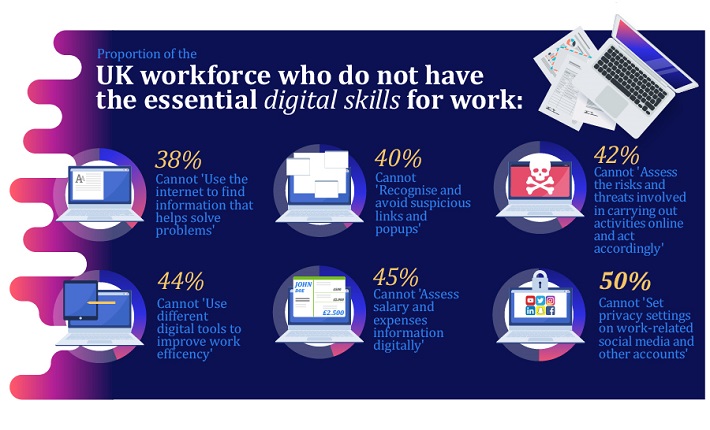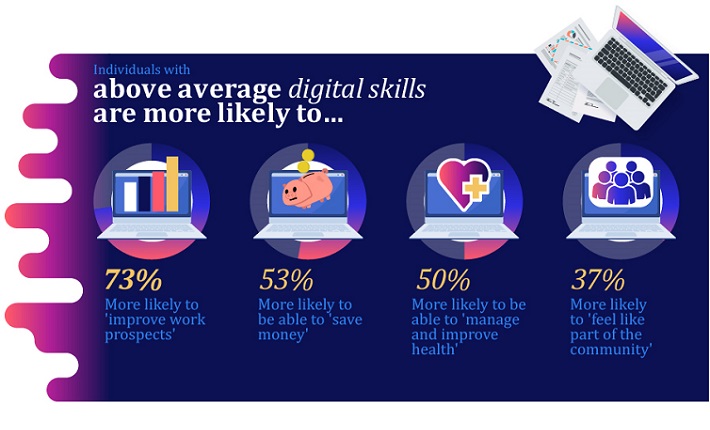Research by Gov.uk indicates that employers struggle to fill about one-third of vacancies due to a lack of the right digital skills amongst applicants and although evidence suggests that the UK does have a strong digitally enabled workforce; there still remains a digital skill shortage.
Currently the term “digital skills” covers a wide array of skills and knowledge, making it difficult to design methods to address specific needs. In order to narrow the gap, it is crucial that individuals possess the basic ‘foundation’ for acquiring digital skills that are needed in this increasingly technological society.
To explore the subject further, Reboot Online Digital Marketing Company analysed the latest findings found within the report ‘The UK Consumer Digital Index’ by Lloyds Bank* to further understand the impact the UK digital skills shortage is having on the job market.
Reboot Online Digital Marketing Company discovered that whilst more than half of the UK uses the internet for work, 53% of employees do not have the essential digital skills needed for work.
According to the report, since last year 1.8 million more people have the highest digital capability. However 37% of the UK are still at risk of being left behind as we continue to advance technologically.

It can be revealed the most significant digital skills gaps within the workplace* include the following:
- 38% cannot ‘Use the internet to find information that helps solve problems’
- 40% cannot ‘Recognise and avoid suspicious links and popups’
- 44% cannot ‘Set privacy settings on work-related social media and other accounts’

With an interest in bridging the digital skills gap, Reboot Online Digital Marketing identified the benefits of being equipped with digital skills.
- 73% more likely to ‘improve work prospects’.
- 53% more likely to be able to ‘save money’.
- 50% more likely to be able to ’manage and improve health’.
Reboot spoke to Martin Calvert, a director at digital marketing agency Blueclaw suggests that the digital skills gap is visible in different ways across different generations:
“We work in a very technical industry, with a lot of specialist software and tools so we don't expect new team members to know everything. Even so, when bringing early-career employees on board, there can be some surprising gaps.
At the other end of the age spectrum, we've worked with some phenomenally experienced professionals but sometimes they need support to be pointed towards the best tools and technology available in 2019 – even if they're extremely savvy and capable when using more ‘industry standard' technologies that have been established for years.
We always need to be looking for new ways to get better at what we do, so regardless of where the team member is in their career, it's vital that we're open and honest about how we can help them to work more effectively with the right technology. In that sense the most important digital skills is more of a trait – openness to new ways of working, a willingness to learn, and a willingness to teach us too!”
Reboot also spoke to Alan Bryant, Strategy Lead at Livity believes the problem lies with the labelling of such ‘digital skills’:
“We've found that young people who are new to the workplace don't necessarily lack the basic digital skills required but do miss some of the soft skills around elements like email etiquette. Young people have native digital skills, having never known a world without ‘digital'.
But we are seeing a lack of motivation to learn specific digital skills for growing career areas such as data analysis. We have found part of the problem here is labelling these areas as ‘digital skills' which simply doesn't mean anything to a generation who don't differentiate between digital and non-digital life.
The pace of change in digital roles and skills also means that many educational establishments struggle to keep up. This is particularly true in a school where a syllabus can be out of date before it's even begun. Then team with a lack of trained teachers from ‘digital' backgrounds, and you can start to see why the digital skills gap exists”











